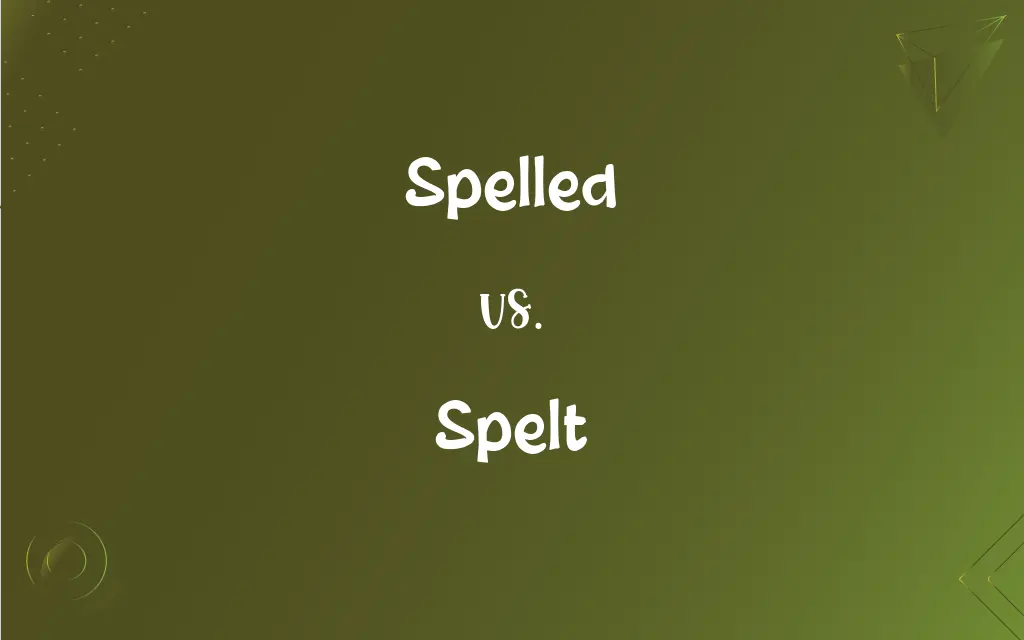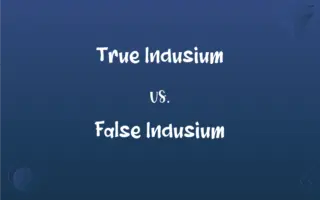Spelled vs. Spelt: What's the Difference?
Edited by Aimie Carlson || By Harlon Moss || Updated on October 19, 2023
"Spelled" and "spelt" are both past tense forms of "spell," with "spelled" being common in American English and "spelt" in British English.

Key Differences
Spelled and spelt are variations of the past tense and the past participle form of the verb "spell." Depending on the regional dialect and language preference, one may be chosen over the other.
In American English, spelled is the preferred and more commonly used version. If you were writing for an American audience or following American English guidelines, you would likely use "spelled" to denote the past action of forming a word from letters.
On the other hand, spelt is predominantly used in British English. So, for those in the UK, Australia, and other places where British English is standard, "spelt" is a familiar and accepted variation for the past tense of "spell."
It's worth noting that both spelled and spelt are recognized and understood globally. However, the preference for one over the other is mostly a matter of regional usage, much like other variations between American and British English.
Additionally, while spelled is almost exclusively associated with the action of spelling, spelt can also refer to a type of wheat, which is a completely different context from its use as a verb form.
ADVERTISEMENT
Comparison Chart
Regional Usage
Commonly used in American English
Predominantly used in British English
Part of Speech
Past tense and past participle of "spell"
Past tense and past participle of "spell"
Alternate Meaning
None
Can also refer to a type of wheat
Global Recognition
Recognized and understood worldwide
Recognized and understood worldwide
Contextual Usage
Solely as a verb form
As a verb form and as a noun (type of wheat)
ADVERTISEMENT
Spelled and Spelt Definitions
Spelled
Indicated or signified.
The dark clouds spelled trouble for the picnic.
Spelt
A kind of wheat grown mainly in Europe.
Spelt flour is often used in artisanal bread.
Spelled
Pronounced letters sequentially to form a word.
He spelled out his name for the interviewer.
Spelt
Formed or pronounced the letters of a word.
She spelt out the terms of the agreement.
Spelled
Denoted the past action of writing or naming the letters of a word.
She spelled the difficult terms for her younger brother.
Spelt
Provided a spelling for a word.
How is that term spelt in British English?
Spelled
Represented in correct writing.
How is that word spelled in English?
Spelt
Past tense of the verb "spell."
He spelt the word incorrectly.
Spelled
Formed a word by arranging letters in a sequence.
She spelled the word correctly on her test.
Spelt
Indicated or signified.
The results spelt success for the team.
Spelled
To name or write in order the letters constituting (a word).
Spelt
A type of wheat (Triticum spelta syn. T. aestivum subsp. spelta) having a tough hull. It was widely cultivated in southwest Asia, the Near East, and Europe during the Bronze Age and is now grown chiefly in Europe.
Spelled
To constitute the letters of (a word)
These letters spell animal.
Spelt
A past tense and a past participle of spell1.
FAQs
Is "spelled" the preferred form in American English?
Yes, in American English, "spelled" is the standard form.
Is "spelled" a valid word?
Yes, "spelled" is the past tense and past participle form of the verb "spell" in American English.
Is "spelled" used in British English?
Yes, while "spelt" is more common, "spelled" is also accepted in British English.
How is "spelt" used in a sentence?
"He spelt the word incorrectly."
How is "spelled" used in a sentence?
"She spelled the word correctly on her test."
How did the two forms come about?
Variations often emerge from regional dialects and linguistic evolution over time.
Is "spelled" more widely used globally?
Due to the influence of American English in global media, "spelled" might be more familiar to international audiences.
Does "spelled" have other meanings?
Yes, it can also mean forming a word by arranging letters in a sequence, e.g., "The letters 'c-a-t' spelled 'cat'."
Is "spelt" used in American English?
While "spelt" is recognized, "spelled" is the more common form for the past tense of "spell" in American English.
Is "spelt" the preferred form in British English?
"Spelt" is widely accepted in British English, but "spelled" is also used.
Why are there two forms of the past tense for "spell"?
Language evolution and regional differences in English usage have led to variations like these.
Can I use "spelt" in formal writing?
Yes, especially in British English contexts. However, for American audiences, "spelled" might be more familiar.
If I use "spelt" in the US, will it be understood?
Yes, while "spelled" is more common, most people will understand "spelt" as the past tense of "spell."
Which form should I teach non-native English learners?
It's beneficial to teach both but emphasize the regional preferences, so learners are aware of the context in which each is used.
Is "spelt" a type of grain?
Yes, "spelt" also refers to an ancient species of wheat known for its nutty flavor.
Are "spelled" and "spelt" interchangeable?
Generally, they can be interchanged as the past tense of "spell," but regional preferences exist.
Do other English verbs have similar variations?
Yes, words like "burned" vs. "burnt" or "learned" vs. "learnt" have similar regional variations.
Is "spelt" a valid word?
Yes, "spelt" is the past tense and past participle form of the verb "spell" in British English.
Which is older, "spelled" or "spelt"?
Both forms have old origins, but "spelt" can be traced back to older forms of English.
Is one form more correct than the other?
No, both forms are correct, but regional preferences should be considered in context.
About Author
Written by
Harlon MossHarlon is a seasoned quality moderator and accomplished content writer for Difference Wiki. An alumnus of the prestigious University of California, he earned his degree in Computer Science. Leveraging his academic background, Harlon brings a meticulous and informed perspective to his work, ensuring content accuracy and excellence.
Edited by
Aimie CarlsonAimie Carlson, holding a master's degree in English literature, is a fervent English language enthusiast. She lends her writing talents to Difference Wiki, a prominent website that specializes in comparisons, offering readers insightful analyses that both captivate and inform.































































